Love: Human And Divine
How many loved your moments of glad grace,
And loved your beauty with love false or true,
But one man loved the pilgrim soul in you,
And loved the sorrows of your changing face.
– William Butler Yeats
Americans often finish their phone calls with relatives by saying “Love you!”

@Pexels: Words may become inflated and empty, when used all too frequently
These two words, or three (“I love you”), or even five (“I love you so much!”), also pop up frequently in other contexts, such as a mother greeting her child upon return from a first scout camp, away from home. Or after the mother’s own return from a long business trip, with feelings of guilt for having been away from her child for so long.
Words or short phrases may become inflated and empty, when they are used all too frequently. Another significant example of this is “Jesus Christ” — a combination of name and title that identifies a spiritual Master. However, it often springs like an insult from the mouths of people who have little or no relationship with that Master. Similarly, the phrase “for Christ’s sake” often expresses the speaker’s exasperation rather than an appeal to the Light that Christ can bring. I hear careless uses of these phrases so often that I’ve had to discipline my mind to preserve the deeper, more intimate meaning that Jesus holds for me.
Still, it can be a good thing to be able to affirm love with a short, habitual phrase, capable of diminishing or avoiding disharmony: I don’t agree with you, but I love you; I’ve been away for some time, and I missed you, because I love you so much; I have to go, but I really don’t want to leave you, because I love you so much; I’m saying these things because I love you!
When you add melody to those words, some of their deeper meaning returns. I remember Yoko Ono, in an interview, speaking about her famous husband, shortly before he was killed: “It’s still very important for John to be able to sing ’I love you.’” Many years after his death we can still feel that significance, when we listen to him singing those or similar words.
Sri Yukteswar, however, sheds an altogether different light on this topic. In Yogananda’s Autobiography of a Yogi, we read about his first meeting with his Guru. At the time, he went by his childhood name, Mukunda. The scene is highly symbolic: a busy marketplace in the Bengali section of the city of Benares represents the world, where people of all backgrounds are buying and selling wares. But Mukunda’s eyes notice a niche unseen by all the others: in a narrow lane he spots “a Christ-like man in the ochre robe of a Swami, standing motionless.” Drawn magnetically to him, he leaves the busy world and walks back to the narrow lane:
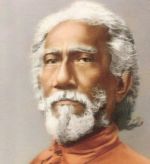
Swami Sri Yukteswar
My quick glance revealed the quiet figure, steadily gazing in my direction. A few eager steps and I was at his feet.
“Gurudeva!” The divine face was none other than he of my thousand visions. These halcyon eyes, in leonine head with pointed beard and flowing locks, had oft peered through gloom of my nocturnal reveries, holding a promise I had not fully understood.
“O my own, you have come to me!” My guru uttered the words again and again in Bengali, his voice tremulous with joy. “How many years I have waited for you!”
We entered a oneness of silence; words seemed the rankest superfluities. Eloquence flowed in soundless chant from heart of master to disciple. With an antenna of irrefragable insight I sensed that my guru knew God, and would lead me to Him. The obscuration of this life disappeared in a fragile dawn of prenatal memories. Dramatic time! Past, present, and future are its cycling scenes. This was not the first sun to find me at these holy feet!
My hand in his, my guru led me to his temporary residence in the Rana Mahal section of the city. His athletic figure moved with firm tread. Tall, erect, about fifty-five at this time, he was active and vigorous as a young man. His dark eyes were large, beautiful with plumbless wisdom. Slightly curly hair softened a face of striking power. Strength mingled subtly with gentleness.
As we made our way to the stone balcony of a house overlooking the Ganges, he said affectionately:
“I will give you my hermitages and all I possess.”
“Sir, I come for wisdom and God-contact. Those are your treasure-troves I am after!”
The swift Indian twilight had dropped its half-curtain before my master spoke again. His eyes held unfathomable tenderness.
“I give you my unconditional love.”
Precious words! A quarter-century elapsed before I had another auricular proof of his love. His lips were strange to ardor; silence became his oceanic heart.
“Will you give me the same unconditional love?” He gazed at me with childlike trust.
“I will love you eternally, Gurudeva!”
“Ordinary love is selfish, darkly rooted in desires and satisfactions. Divine love is without condition, without boundary, without change. The flux of the human heart is gone forever at the transfixing touch of pure love.” He added humbly, “If ever you find me falling from a state of God-realization, please promise to put my head on your lap and help to bring me back to the Cosmic Beloved we both worship.”
Yogananda then proceeds to describe the years of training he underwent in his Guru’s ashram, confronting and gradually accepting the relentless discipline he received there.
When I had abandoned underlying resentment, I found a marked decrease in my chastisement. In a very subtle way, Master melted into comparative clemency. In time I demolished every wall of rationalization and subconscious reservation behind which the human personality generally shields itself. The reward was an effortless harmony with my guru. I discovered him then to be trusting, considerate, and silently loving. Undemonstrative, however, he bestowed no word of affection.
Silently loving, but no words of affection — no “Love you,” no “I love you,” no “I love you so much!” A quarter-century later, Yogananda, after fifteen years of sharing his Guru’s teachings in America, returns to India. The chapter dedicated to that visit, called Last Days with my Guru, contains one of the most touching episodes in the whole book.
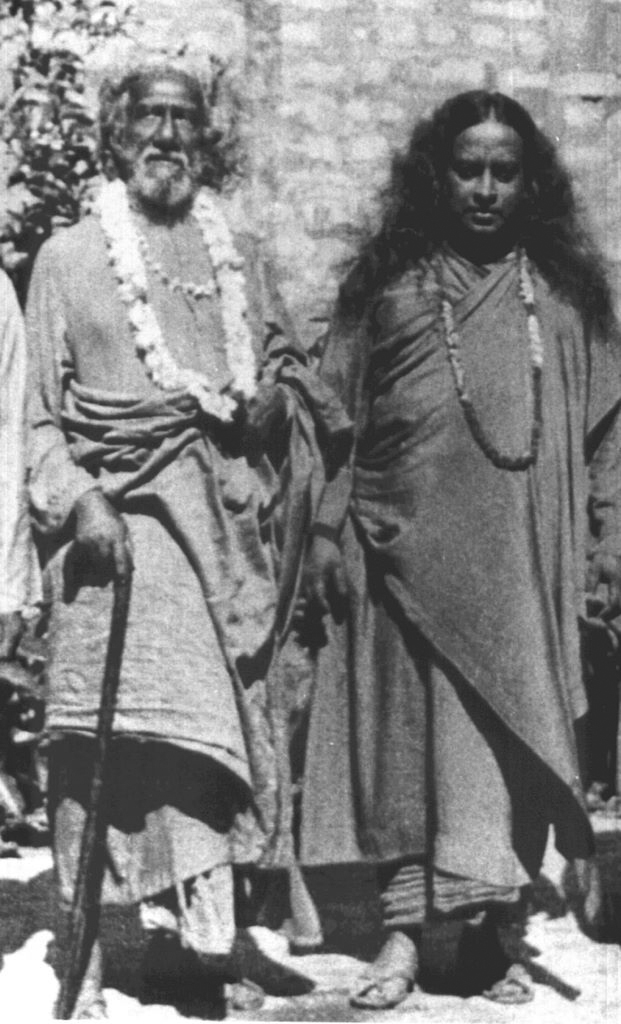
Swami Sri Yukteswar and Yogananda
“Guruji, I am glad to find you alone this morning.” I had just arrived at the Serampore hermitage, carrying a fragrant burden of fruit and roses. Sri Yukteswar glanced at me meekly.
“What is your question?” Master looked about the room as though he were seeking escape.
“Guruji, I came to you as a high-school youth; now I am a grown man, even with a gray hair or two. Though you have showered me with silent affection from the first hour to this, do you realize that once only, on the day of meeting, have you ever said, ‘I love you’?” I looked at him pleadingly.
Master lowered his gaze. “Yogananda, must I bring out into the cold realms of speech the warm sentiments best guarded by the wordless heart?”
“Guruji, I know you love me, but my mortal ears ache to hear you say so.”
“Be it as you wish. During my married life I often yearned for a son, to train in the yogic path. But when you came into my life, I was content; in you I have found my son.” Two clear teardrops stood in Sri Yukteswar’s eyes. “Yogananda, I love you always.”
“Your answer is my passport to heaven.” I felt a weight lift from my heart, dissolved forever at his words. Often had I wondered at his silence. Realizing that he was unemotional and self-contained, yet sometimes I feared I had been unsuccessful in fully satisfying him. His was a strange nature, never utterly to be known; a nature deep and still, unfathomable to the outer world, whose values he had long transcended.
Strange to tell, in my younger years I was somewhat skeptical about this scene, thinking: Why would a great Master like Yogananda need such confirmation from his Guru? And why would the Guru be so emotional about it? In other words: How can they be so human?
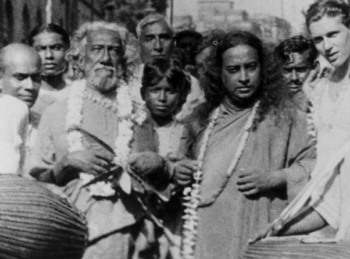
intuitive, wordless bond they share
Over the years I have come to realize that there can be no divinity without humanity, and that it is their humanity that completes the greatness of these two men: highly evolved, and marked by the intuitive, wordless bond they share, untouched by distance in space or by the passage of time.
Let’s ask ourselves honestly: Can the love between two egos ever fully satisfy the heart? I remember — years ago, in the company of Swami Kriyananda and a group of devotees from Rome — attending a conference given by an acquaintance. This man’s sentimental message was: Let us all love each other and be kind to each other. To make his point, he had taken a devotional chant by Kriyananda and changed the words so that they would fit his philosophy. The original words were:
My heart is Thine, always Thine, Lord
Singing to You
Loving You
I live in a heaven of joy.
Our friend had changed the object of his love, from God to his girlfriend. He sang Kriyananda’s melody with the following words:
I love you so much
I sing it to you
I love you
And that makes me happy!
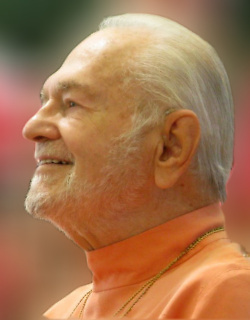
Kriyananda
We devotees from Ananda Rome were somewhat mellowed by this conference. For a week or two, we tried to bring more harmony into our honest attempts to cooperate with each other, including a final note of “I love you” on our phone calls, such as this presenter had encouraged and many Americans do. But then, during a lunch with a few of us, Kriyananda gave his view on this type of communication. He had not appreciated the man’s rendition of his devotional song, and added: “I hardly express love explicitly, with words. Rather through my actions. And my first attentions always go to God, the source of all love. By contacting Him first, His love can flow through me to other people. That love alone can transform them. My love alone, by comparison, would barely scratch the surface.”
Love for God, religiously speaking, is devotion. Devotion is feeling, steadied by focus. It is love plus commitment.
It is important to understand, that this does not in any way diminish the importance of human love. Nature herself has deeply planted the need for human love in our hearts, especially in the form of the mother instinct. On a more physiological level, this instinct serves the survival of the species. No living, conscious being can survive without some measure of maternal love. It is not simply being the fittest that enables survival — as Darwin has stated — but rather the bond between mother and infant.
Sri Yukteswar does not separate Nature from God, but neither does he focus on its mere physiological aspects. Instead, he identifies the spiritual essence that underlies Nature and calls it by a beautiful Sanskrit word, Prakriti. This is how he describes it:
The Almighty Force, or in other words the Eternal Joy, which produces the world; and the Omniscient Feeling, which makes the world conscious, demonstrate the Nature of God the Father.[1]
The feeling that makes the world conscious — these powerful words bring back a memory. Long ago my youngest son, age five at that time, asked me, out of the blue: “Dad, do you exist?”
“Yes,” I responded, without thinking.
The answer, I now think, was just as interesting as the question, coming out of the mouth of a little child.
What made it interesting was its immediacy.
Of course I exist! A thousand fleeting joys, a thousand heartaches, a thousand hard lessons to be learned, and so much more of life’s abundance, have been making me keenly aware of the fact that I exist. All these impressions were perceived, and there can be no perception without existence.
When I write “perceived,” perhaps I really mean felt, for Sri Yukteswar says, paraphrasing the above: feeling makes existence conscious. By extension, the more our feelings are attuned to a spiritual presence in Nature and within us — which he calls “the Father” — the more our consciousness expands. This attunement of feelings, too, is called devotion.
Looked at from this grand perspective, love is no longer an instinct for physical survival, it is, indeed, a heavenly gift of Nature, for the unfoldment of our innate spirituality.
There is really nothing pious or hypocritical about true devotion. It is not lip service to the church, offered through endless mumbled prayers. Nor is it an emotionally charged sermon shouted from a pulpit. It isn’t even the wonderful enthusiasm we may feel at the beginning of our spiritual quest. It is rather the determination, on the battlefield of daily life, to focus resolutely on such qualities as peace, Divine love, self-control, and Light.
The feminine part within us tends to focus on our present feelings as our ultimate reality. “I feel what I feel, and I cannot feel what I don’t feel,” is the rationalization behind this attitude. Feeling is, by nature, peremptory. “Convinced against its will, it is of the same opinion still.”

@unsplash: Nature continually urges us to expand our consciousness
On the other hand, once Nature has evolved to the level of the human species, it continually urges us to expand our consciousness, and this process has to involve the faculty of feeling. If we accept the idea that the feelings of the heart are multilayered, then we must also accept that one layer of feeling cannot deny the existence of deeper layers. Our reaction to music may very well exemplify this.
I once had a friend who, upon hearing the second movement of Mozart’s Piano Concerto no.21 for the first time, looked as if a new inner world of beauty had opened up for her. An interesting conversation followed.
“How is it possible for anyone to write something so incredibly beautiful?” she asked in amazement after a long silence.
“You have to be beautiful inside to be able to produce something beautiful outside,” I answered.
Her subsequent response to my musing did not surprise me, for I knew that she had grown up with few thoughtful, cultured people around her. Her family had been dysfunctional. She felt that life had cheated her, and was generally pessimistic about human nature and about herself. She visibly struggled with her initial reaction to the music that had moved her so deeply and finally said:
“No! This Mozart has simply mastered some very special technical skill!”
I tried to convince her, but to no avail. The vinyl long-play record was put away, and with it, the new wealth of feeling the music had awakened in her heart.
The price for not heeding Nature’s call for emotional and spiritual growth is depression, as I soon discovered in my friend.
This conversation took place in the Netherlands, where the prevailing religion, Calvinism, has left little room for feeling. The religious history of my country is all about moral and civic rectitude, hard work, financial stability, and a predestined fate. Jesus is supposed to be the great inspiration of this religion, but I have never understood where he actually fits in this bleak picture. A visit to another land initiated a personal awakening: the innate devotion that I had felt for Jesus as a little child was rekindled by my first journey to Italy, at age seventeen.
After that first journey, it was my heart, much more than my mind, that began to perceive the possibility of a consciousness greater than the limitations of ego, which had previously seemed inextricable. This deeply felt intuition led me towards Eastern philosophy, without estranging me from the sense of Jesus dwelling in my heart. When I first started reading about Swami Sri Yukteswar, in Yogananda’s Autobiography of a Yogi, the stories about this great Master of wisdom evoked a heart-felt awareness of ancient memories.
The same feeling still arises when this great Master wraps his aura around me through that little booklet that he wrote. Again, I can by no means claim that I understand every word of The Holy Science, yet I do feel that his light of wisdom gradually spiritualizes all the living atoms in my heart, in the stages that he himself identifies.
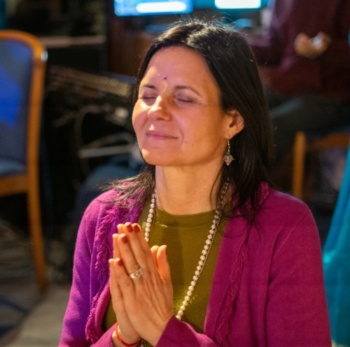
devotion
I become enthused; I steady my enthusiasm through efforts to follow his instructions. I cultivate a desire to turn within. I develop devotion.
Devotion, Sri Yukteswar teaches us, is the heart’s desire for connection with the inner realities of the soul. The mental focus required to satisfy this desire gradually frees the heart of what oppresses it. This process particularly draws our attention to the “north” or positive pole of the sixth chakra — the ajna chakra, often called the spiritual eye, or the “third eye” — located at the point between the eyebrows.

The door to an unknown astral land
Before we end this blog with additional thoughts from Sri Yukteswar, let us imagine that we are standing at the entrance door to an unknown astral land of rare natural beauty and of spiritual possibilities beyond our dreams. The colors, the sounds, and the fragrances permeating the air elevate our consciousness to a level where we can perceive the union between Spirit and the Prakriti he has defined. The nourishment of this astral visit is a thousand times more satisfying than the most exquisite meal prepared for us on earth. Sri Yukteswar wants us to open that door. The following inspirational lines paraphrase his instructions:
By concentrating on the spiritual eye and by remaining centered in the spine, you will become baptized or absorbed in a holy stream of the Divine Sound. This baptism is called Bhakti Yoga. In this state you will make a definitive change of direction: turning from this gross material creation of Darkness, Maya, you will climb back toward your own Divinity, your Eternal Father, whom you had left.
[1] Sri Yukteswar, The Holy Science, Chapter 1

2 Comments
Prachtig geschreven en ook leerzaam. Ik vind het nog moeilijk om met divine love om te gaan. Soms lijkt het weer gewoon menselijke liefde en dan weer iets hogers wat rustiger voelt. We blijven leren. Dank je wel!
Dear Darshan
Thank you fo this wonderful piece of writing. It is both wise and inspiring.
Blessings
Stan